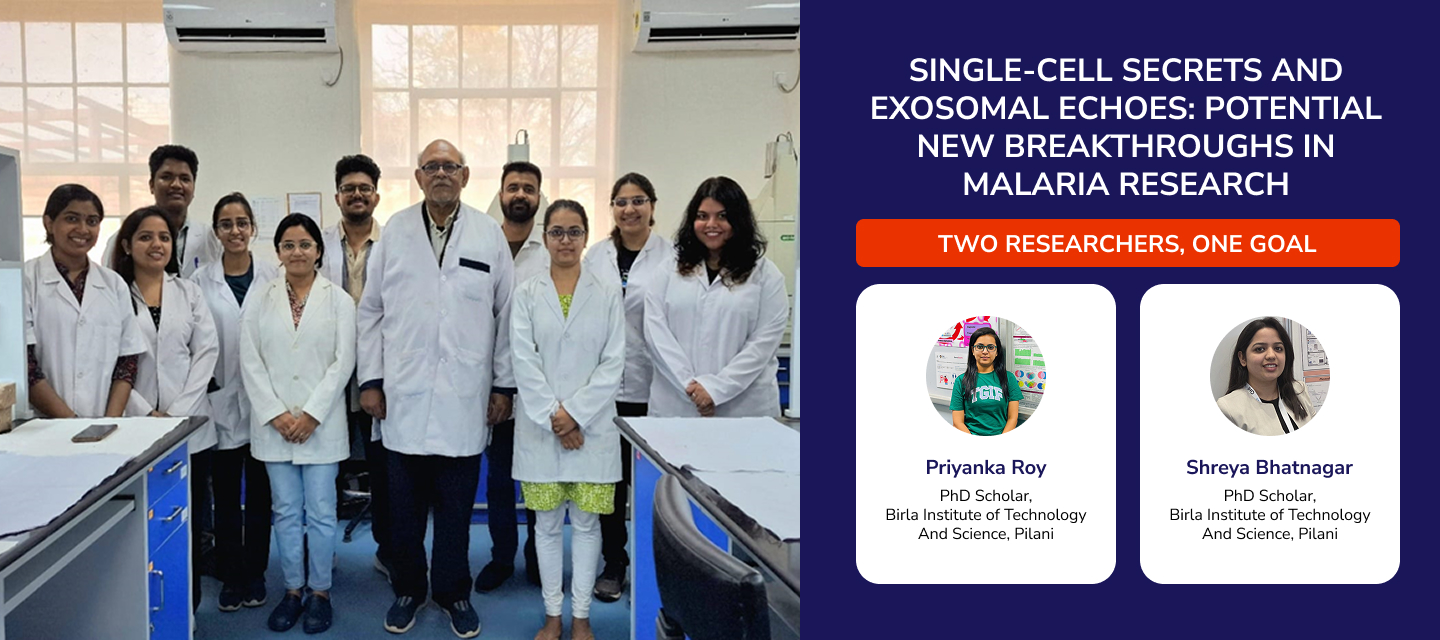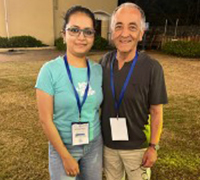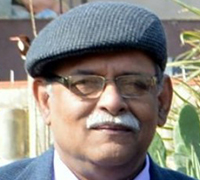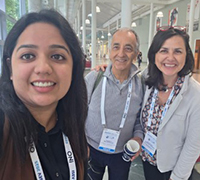Test Webpage


Priyanka Roy
PhD Scholar, Birla Institute of Technology And Science, Pilani
Prof. Hernando A. del Portillo
ISGlobal - Barcelona Institute for Global Health

Prof. Ashis Kumar Das
Birla Institute of Technology And Science, Pilani

Shreya Bhatnagar
PhD Scholar, Birla Institute of Technology And Science, Pilani
Prof. Carmen Fernández
ISGlobal - Barcelona Institute for Global Health
Highlights of Achievements
- Transcriptomics: Landmark contributions to the understanding of Natural Antisense Transcripts (NATs) in Plasmodium species, redefining the molecular landscape of malaria and unlocking new paths toward precision diagnostics and therapeutic innovation.
- First to identify and publish the presence of NATs in Plasmodium vivax (Boopathi et al., 2013) and, to our knowledge, also the first to report NATs in P. falciparum from patient-derived samples (Subudhi et al., 2014), challenging long-held assumptions in parasite transcriptomics.
- Distinct NAT expression signatures between uncomplicated and complicated malaria, with altered antisense/sense RNA ratios closely associated with severe clinical outcomes, highlight the regulatory potential of NATs in modulating gene expression and parasite adaptability, and also underscore their value as candidate biomarkers for disease severity with potential applications in prognostics and therapy
- Epitranscriptomics: First group to map RNA methylation signatures (m⁵C and m⁶A) on the same transcript, and alternative splicing events in both sense and NATs of P. falciparum and P. vivax at single-base resolution using Nanopore Direct RNA Sequencing directly in clinical isolates (Roy et al.,2025). This work provides the first-ever ex vivo snapshot of epitranscriptomic modifications in malaria parasites. These achievements mark a significant leap in malaria transcriptomics, providing a strong foundation for future diagnostics and therapeutic strategies.
- Proteomics- Our excitement with extracellular vesicles arises from our study analysing their protein contents in clinical malaria, showing different manifestations. Comparative proteomic studies have shown the presence of molecules which has the potential of being used as either prognostic/detection markers.
Our Goals for 2026
- Novel Diagnostic Alternatives:
Learning preliminary techniques for isolation of EVs from small volumes of plasma samples, essential for designing point-of-care devices.
- Advanced Proteomic Analysis:
For diagnostic-based studies.
- A potential game-changer :
Small volume EV isolation.
- Build India’s First Clinical-Grade scRNA-seq Malaria Platform:
Establish and optimize cutting-edge single-cell transcriptomics for patient-derived P. vivax samples, scalable for national malaria programs and research hubs.
- Expand the Global Malaria Cell Atlas:
Contribute P. vivax specific, clinical-stage data to global repositories.
- Decode Disease Severity Mechanisms:
Dissect transcriptional differences between uncomplicated and severe malaria at single-cell resolution paving the way for novel diagnostics and therapeutics
Objective of the training program:
- To decode the stage-specific transcriptional landscape of Plasmodium vivax from clinical isolates using single-cell RNA sequencing (scRNA-seq).
- To investigate transcriptional differences between uncomplicated and severe malaria at single-cell resolution.
- This is the 2nd To expand the Malaria Cell Atlas by incorporating P. vivax asexual blood-stage single-cell data.
- Explore the Comparative proteomics of Extracellular vesicles in cases of severe malaria.
- Devise methods for isolating these vesicles from ultra-low volumes of Plasma.
Potential impact of the training program on our overall objectives:
The proposed training programme at Prof. Hernando A. del Portillo’s lab is pivotal to achieving our scientific goals and holds transformative potential for malaria research in India. This hands-on exposure to advanced single-cell transcriptomics technologies will enable us to adapt and optimize cutting-edge protocols specifically for Plasmodium vivax clinical isolates: an area significantly underexplored due to limitations in setting up continuous parasite culture. By gaining direct expertise in processing field-relevant clinical samples and analyzing data using robust bioinformatics pipelines, we will establish a replicable and scalable workflow that can be implemented across resource-limited settings. Furthermore, the training will lay the foundation for building India’s first clinical-grade single-cell platform for malaria, fostering long-term national capacity building. joint funding, student exchanges, and the data and methodologies generated through this initiative will feed into global projects such as the Malaria Cell Atlas and directly impact therapeutic development pipelines. In essence, this training is not merely a technical exercise, but a strategic investment toward empowering indigenous research, accelerating translational science, and contributing meaningfully to the global fight against malaria.
This program will further provide an opportunity to understand the intricacies of Extracellular vesicle biology during malaria pathogenesis. With the expertise of Prof Carmen Fernández at ISGlobal's research centre and their work on Plasmodium EVs, exploring multiple dimensions of host-pathogen interactions. The Fernández group is also involved in scientific exploration of advanced techniques for the enrichment and characterization of EVs.
After this training, we will be skilled in advanced proteomics techniques for analyzing EV contents from small volumes of body fluids. (It is important to note here that we ourselves have made significant progress in isolation of EVs from larger volumes of body fluids and characterization of their contents). This interaction will also serve as a launchpad for sustained Indo-Spanish collaboration, creating avenues for joint funding, student exchanges, and cross-institutional innovation
Relevance to the Institute, National, and Global Environments
- Training - On returning after the successful completion of this program, it equips researchers from the Department of Biological Sciences, BITS Pilani, with advanced analytical techniques.
- BITS Pilani has strong groups working on different aspects of diseases caused by the malarial parasites. This training will enable researchers to move to the next level of transcriptomics under clinical conditions. Thus, strengthening and supporting our data regarding molecules potentially useful for detection or therapy. This would be of immense benefit to the institute and the national and international environment.
- By mastering these cutting-edge technologies, we will be able to generate granular, stage-specific gene expression data that can uncover the molecular drivers of disease severity, host–parasite interactions, and immune evasion strategies. These insights are critical for the development of next-generation diagnostics, vaccines, and targeted therapies for malaria. Importantly, the knowledge and skills acquired through this training will be translated into building an advanced research platform in India, creating long-term benefits for public health by strengthening our national capacity to tackle not only malaria but also other complex infectious diseases.
- The program will promote global collaboration, data sharing, and research equity by enabling Indian researchers to contribute to international initiatives like the Malaria Cell Atlas. In the broader societal context, this initiative aligns with the global goal of malaria elimination and promises to improve disease management strategies in endemic regions, ultimately reducing the health and economic burden of malaria on vulnerable populations.
Budget
| Category | Amount (€) |
|---|---|
| Accomodation | 5999.76 |
| Monthly Expense | 5510.92 |
| Travel Cost | 2365.61 |
| Shipping | 5000 |
| Contingency | 2464.18 |
| Round Off | 21615.25 (~22 Lakh) |
Be a Part of this Research Endeavour:
Join us in fighting malaria. With your support, this dream can become reality!
Donation Goal: €21,615.25
All Payment Methods
Contact us for further assistance:














